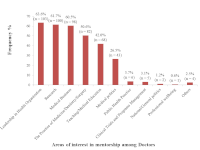Improving mentor-mentee relationships in the medical profession: analysis of responses from physicians
Main Article Content
Abstract
Background: Mentorship is the act and process of transmitting appropriate skills, attitude and character from a more knowledgeable and experienced person (mentor) to a less experienced person (Mentee) in a given field of endeavour or profession.
Aim: To analyze responses from physicians on ways of improving mentorship in the medical profession.
Methods: A prospective analytical study of responses from physicians at various level of training across several fields of the medical profession carried out in June 2021 amongst physicians in Port Harcourt. Data obtained through an electronically generated semi-structured questionnaire on mentorship were analyzed descriptively using the Statistical Package for Social Sciences (SPSS) version 21.
Results: One hundred and sixty-two medical doctors participated in the study comprising 67 (41.4%) males and 95 (58.6%) females giving a male to female ratio of 1: 1.4. The predominant age group was 31-40 years (40.1%). Forty-seven (29%) have practiced medicine for between 11-15 years. One hundred and thirty-seven (84.6%) doctors practiced in public hospitals. Majority of the doctors were consultants. Only 42 (25.9%) of the medical trainers and trainees have ever been involved in formal (structured) mentoring. Majority had been involved in informal mentorship. The areas of interest for mentorship identified by the doctors include the practice of medicine/surgery/dentistry, leadership in health organization, research, teaching/medical education, medical business amongst others. Effective mentorship requires that mentors should clarify mentees on what their roles should be (61.7%), discuss possible solutions to difficult issues (49.4%) and help mentees identify their strengths and weaknesses (58.0%).
Conclusion: Mentor-mentee relationships can be improved among medical practitioners.
Downloads
Article Details

This work is licensed under a Creative Commons Attribution-NonCommercial-ShareAlike 4.0 International License.
The journal grants the right to make small numbers of printed copies for their personal non-commercial use under Creative Commons Attribution-Noncommercial-Share Alike 3.0 Unported License.
References
1. Manthiram K, Edwards KM. Reflections on the mentor-mentee relationship. J Pediatric Infect Dis Soc 2021;10(11):1040-1043.
2. Standing Committee on Postgraduate Medical and Dental Education. Supporting doctors and dentists at work: an enquiry into mentoring. London: SCOPME, 1998.
3. Achor MT, Briggs DC, Diamond TE, Anochie I. Mentees’ perspectives on the factors that influence the choice of mentors in the medical profession. Acta Scientific Women's Health 2023;5(7):28-34.
4. Hazzard WR. Mentoring across the professional lifespan in academic geriatrics. J Am Geriatr Soc 1999;47(12):1466–1470.
5. Rivers State Ministry of Health. Rivers State Government Strategic Health Development Plan 2010- 2015. Port Harcourt: Rivers State Ministry of Health, 2010.
6. Nettles MT, Millett CM. Three magic letters: getting to Ph.D. Baltimore, MD: Johns Hopkins University Press, 2006.
7. Johnson WB. The intentional mentor: strategies and guidelines for the practice of mentoring. Professional Psychology: Research and Practice 2002;33(1):88–96.
8. Holmes DR Jr, Warnes CA, O'Gara PT, Nishimura RA. Effective attributes of mentoring in the current era. Circulation 2018;138(5):455-457.
9. Cho CS, Ramanan RA, Feldman MD. Defining the ideal qualities of mentorship: a qualitative analysis of the characteristics of outstanding mentors. Am J Med 2011;124(5):453-458.


